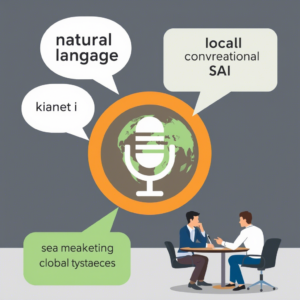One of the most significant changes is occurring in instant messaging platforms, and WhatsApp is a leader in this space. With billions of active users, WhatsApp has become a powerful tool for businesses of all sizes. What’s truly transforming sales on WhatsApp, however, is the use of automated chatbots for e-commerce.
These intelligent bots not only facilitate communication with customers but also optimize sales processes, offering immediate support and making the shopping experience simpler and faster.
Today, the use of chatbots on WhatsApp goes beyond basic customer service—they are revolutionizing how we shop online. This article explores the future of WhatsApp sales with chatbot integration, their functionalities, challenges, and benefits for e-commerce.
Customer Communication Is the Soul of Any Business
In e-commerce, where interactions are often limited to device screens, maintaining agile and efficient communication can be a significant differentiator. Automated chatbots emerge as a practical and efficient solution to help businesses overcome customer service challenges. They can respond to frequent questions, guide customers through the shopping journey, and even process orders and payments directly on WhatsApp.
With the growing popularity of WhatsApp for business, more companies are adopting chatbots to enhance their customers’ shopping experience. In the past, consumers had to wait long periods to be assisted by a human representative. Now, they can get instant responses and continue shopping without interruptions.
In this article, we will delve into how chatbots are shaping the future of e-commerce, particularly on WhatsApp, and why businesses must consider this technology as a central part of their sales strategies.
What Are Automated Chatbots for E-commerce?
Chatbots are programs designed to simulate human conversations through text or voice messages. In the e-commerce context, automated chatbots are configured to interact directly with customers on platforms like WhatsApp, facilitating customer service and purchase processes. They efficiently perform repetitive tasks such as:
- Answering frequently asked questions (FAQs).
- Providing details about products and services.
- Guiding customers through the checkout process.
- Automating order tracking.
- Recommending products based on preferences and previous purchases.
This automation enables businesses to offer 24/7 customer service without needing a human team to monitor interactions constantly. The result is faster, more efficient, and more satisfying service for both businesses and customers.
Additionally, these chatbots can be programmed to learn from every interaction, using artificial intelligence (AI) to improve their responses over time. This means that the more a chatbot interacts with customers, the smarter it becomes.
How Do Automated Chatbots Work on WhatsApp?
WhatsApp Business was launched to help companies connect directly with their customers, providing a platform where sales and customer service can happen in an integrated way. With the implementation of chatbots on WhatsApp, businesses can now automate much of their communication and sales processes.
These bots can be directly integrated with a company’s e-commerce system, meaning they have real-time access to crucial information such as inventory, prices, and order data. The process can be summarized as follows:
Initial Interaction: The customer sends a message to the company’s WhatsApp number, initiating an interaction. The chatbot detects the message and automatically responds based on predefined programming.
Needs Detection: The chatbot asks the customer about their needs. For instance, if a customer is seeking information about a specific product, the bot may ask for details like the product name or category.
Personalized Recommendations: Using data such as purchase history, previous behavior, and customer preferences, the bot can suggest relevant products that meet the customer’s needs.
Purchase Facilitation: The chatbot helps the customer complete the purchase directly on WhatsApp. It provides links for secure payment options, shipping choices, and real-time order confirmation.
Post-Sale Follow-up: After the purchase, the bot continues interacting with the customer, providing updates on order status and offering assistance if needed.
Advantages of Automated Chatbots for E-commerce
1. Immediate and Personalized Service
Customers demand fast and accurate responses. An automated chatbot provides immediate service without wait times. Additionally, by personalizing the conversation based on customer data like purchase history or preferences, the bot creates a more engaging and tailored experience.
2. Cost Reduction
Maintaining a large customer service team can be expensive, especially for businesses operating 24/7. Chatbots drastically reduce operational costs since they can handle countless simultaneous interactions without needing breaks.
3. Increased Operational Efficiency
Automated chatbots improve operational efficiency by handling multiple tasks simultaneously. Integrated with e-commerce systems, they provide real-time information about inventory, orders, and payments.
4. Direct Sales on WhatsApp
Chatbots allow businesses to complete sales directly on WhatsApp, streamlining the customer journey. Customers can discover products, make purchases, and finalize transactions within a single communication channel.
5. 24/7 Availability
The digital market never sleeps. With chatbots, businesses can provide continuous support, allowing customers to make inquiries and purchases at any time.
Practical Examples of Chatbots in E-commerce
- Personalized Service in a Fashion Store
- A fashion store chatbot can recommend new collections based on previous purchases, increasing the chances of repeat sales.
- Simplified Purchase Process
- A cosmetics brand uses a bot to showcase products, guide the customer through checkout, and complete the purchase—all within WhatsApp.
- Quick Responses to FAQs
- An electronics store’s bot handles frequent questions about product specs, warranties, or return policies, ensuring instant customer satisfaction.
Challenges of Automated Chatbots for E-commerce
- Limited Complex Interactions
- Chatbots may struggle with highly specific questions or complex problems, requiring human intervention.
- Need for Constant Updates
- Businesses must invest in regular updates and maintenance to ensure accuracy and optimal performance.
The Future of Chatbots in E-commerce
As technology evolves, chatbots will become smarter and more human-like. They’ll integrate seamlessly with platforms like CRMs and ERPs, providing a comprehensive view of customer journeys. Voice integration will further enhance convenience.
Conclusion
Automated chatbots for e-commerce are revolutionizing sales on WhatsApp. Despite existing challenges, their benefits—such as cost reduction, operational efficiency, and improved customer experience—make them a critical asset for businesses.
Companies aiming to remain competitive in the digital landscape must embrace this technology. The future of WhatsApp sales is here, and it’s automated.
Frequently Asked Questions (FAQ)
- How do chatbots help with WhatsApp sales?
They provide quick, personalized responses, simplify the purchase process, and ensure 24/7 availability. - What are the main benefits of chatbots for e-commerce?
Immediate service, cost savings, efficiency, direct WhatsApp sales, and constant availability. - Can chatbots replace human service?
They handle simple interactions but require humans for complex issues. - Is it safe to use chatbots for sales on WhatsApp?
Yes, they integrate with secure payment systems to protect customer data. - How can I integrate a chatbot with WhatsApp?
Use platforms offering ready integrations or hire developers for custom bots. - Do chatbots increase sales?
Yes, by enhancing customer experience and boosting conversion rates. - What challenges do chatbots face in e-commerce?
Limited complex interaction capabilities and the need for constant updates.




